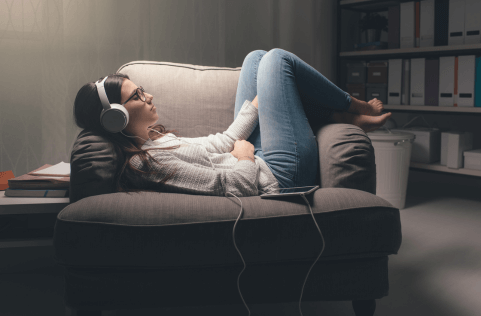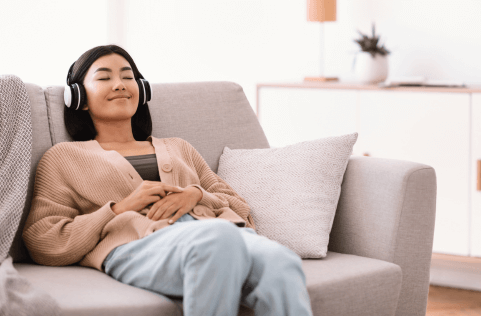When was the last time a song came on and you just started spontaneously dancing or singing? What kind of music was it? How did it feel to let yourself enjoy that moment? Did you notice your mindset change or shift afterwards? We often forget how powerful it can be to add music to your recovery toolbox - it is yet another means of coping with difficult emotions and reducing anxiety and stress.
Listening to music is a universal human experience. Music carries memories, holidays, culture, and celebrations. We talk a lot about coping strategies and distraction on the blog when we talk about eating disorder recovery and we’re here to say that music can definitely be an awesome self-care tool.
Many websites will recommend watching your favorite TV show as a helpful distraction during a meal, or journaling when you feel stuck in one stage of ED recovery. All of these tools are fantastic, but in a world that is already full of screens and homework/work writing assignments, it can be nice to take a break from that.
When the going gets tough in ED recovery, we want all the coping strategies available - so start making those recovery playlists! You got this.

4 reasons to add music to your recovery toolbox
music helps to reduce anxiety and stress
Have you ever been in the car and heard a song that completely changed your mood and just for a minute you forgot about what was bothering you? You listen, you sing along, you smile! Even if it was only for a second, you forgot about the stress and anxiety and could focus on something else. What a wonderful feeling!
Part of this response is that music actually raises the dopamine levels in our brain. The feel-good feeling you get when a song you like comes on is definitely real. When you’re in the dregs of eating disorder recovery and feeling hopeless about treatment, remember music as a tool in your back pocket. Not only can music make us feel better, but it can also actually reduce our stress and anxiety.
This meta-analysis of many studies looking at the link between music and stress and anxiety in critically ill patients found that music therapy caused a significant reduction in stress and anxiety levels. Another study found that singing reduced anxiety after eating in ED patients and that listening to classical music helped motivate patients to eat during meals. Music can bring our brain out of “fight or flight” mode and back to a space where we can think clearly about the present moment. We can think about food and body more logically, rather than allowing the eating disorder to take the reins and tell us how we should feel. We can take some deep breaths and move on with our lives, rather than staying stuck in a stressed, anxious state.
music can keep you motivated
In ED recovery it can be really difficult to continue to follow your meal plan every day. If you feel like you need some extra help, reach out to us for support. In the meantime, finding motivation from outside sources can be helpful when you’re not feeling motivated to recover. Music can give you a little extra boost if you put on the right songs! Make a “Choose recovery” playlist of songs that motivate you to recover. Put it on when you need a little extra boost to go get that meal or snack!

music can help distract from difficult situations
In addition to being motivating, music can also be a great distraction. Putting on music throughout the day can help distract you from intrusive thoughts. Make some playlists for yourself. Make a playlist of songs that when you hear them you have to sing along. Put that one on when the intrusive thoughts are starting to overwhelm you.
Instead of letting those thoughts roll around on repeat in your head, distract yourself with a sing-along sesh - which can be a much more enjoyable use of time. Most importantly, make a mealtime playlist for distraction. If you need some ideas for the playlist, our friend Tiffany Roe, LMHC made an Eating Disorder Recovery Playlist on Spotify. Use it when you need a new distraction to help you get through mealtimes. You’ve got this! As always, if you need some individual help in knowing what else to add to your recovery toolbox, we’ve got you covered.
music can help regulate mood
Music has been part of the human experience since wayyyy before Spotify. Studies show that listening to sad music can help us process those emotions more effectively and efficiently. On the other hand, listening to upbeat music can actually help us feel happier - music can even lead to a greater quality of life. When moods and emotions are running high in eating disorder recovery, consider trying to find songs that explain the way you feel. Listening to those songs can make you feel understood, even if the song isn’t about you. When we feel understood we feel better.
We can move forward with recovery even though it’s hard. Using music to help regulate emotions can help us move in the right direction with recovery. The best part is that music is always there! Unlike your dietitian or therapist who you only see once a week, you can listen to music almost anywhere, anytime. So make some more playlists of songs you can turn to when you’re feeling happy, sad, or like you’re in a funk. Having those songs easily accessible will help you move through those emotions so you can focus on recovery with a clear head.

how nourishrx can support you
As always, at NourishRX we want you to receive the high-quality care you need and deserve. Work with us if you need some extra help and support! We have many kinds of services available, so choose what works best for you!
Comments Off on 4 Reasons to Add Music to Your Recovery Toolbox